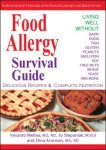Get Abdominal Pain, Diarrhea or Other Digestive Issues? It May Be Celiac Disease
by www.SixWise.com
If you suffer from frequent abdominal pain, chronic diarrhea, indigestion or gas, you may have celiac disease.
People who suffer from celiac disease, also known as celiac sprue or gluten intolerance, cannot tolerate gluten, a protein found especially in wheat, rye, and barley.
Although gluten is mainly found in foods, everyday products such as stamp and envelope adhesive, medicines, and vitamins contain gluten as well.
|

Celiac disease is the most common genetic disease in Europe and is quickly becoming more popular in America. In fact, it is now estimated that one in every 133 people has it. Unfortunately it may not be properly diagnosed as celiac disease because:
- Celiac symptoms can be attributed to other problems
- Nany doctors are not knowledgeable about the disease
- Only a small number of U.S. laboratories are experienced and skilled in testing for celiac disease.
|
Celiac Disease
According to Joseph Murray, MD, a gastroenterologist who specializes in the treatment of the disease, "Celiac disease is a permanent intolerance to gluten that results in damage to the small intestine and is reversible with avoidance of dietary gluten."
When people with celiac disease eat foods or use products containing gluten, their immune system responds by damaging the small intestine.
The tiny, fingerlike protrusions lining the small intestine, called villi, are damaged or destroyed. Villi are what normally allow nutrients from food to be absorbed into the bloodstream, so without healthy villi, a person becomes malnourished, regardless of the quantity of food eaten.
Celiac disease is a genetic disease, meaning it runs in families. Sometimes the disease is triggered -- or becomes active for the first time -- after surgery, pregnancy, childbirth, viral infection, or severe emotional stress.
Symptoms of Celiac Disease
Researchers estimate that 97% of people who have celiac disease remain undiagnosed and untreated. Patients are often first diagnosed with other conditions such as IBS, Crohn's disease, chronic fatigue syndrome, and lactose intolerance since they share similar symptoms and because of the lack of knowledge of this celiac disease in the U.S.
Symptoms vary among celiac disease patients; however, some symptoms shared by many are shown in the following chart:
|
Common Celiac Disease Symptoms
- Excessive gas
- Recurring abdominal bloating and pain
- Chronic diarrhea
- Pale, foul-smelling, or fatty stool
- Weight loss
- Missed menstrual periods
- Fatigue
|
- Irritability
- Joint pain
- Behavioral changes
- Discoloration of the teeth
- Anemia
- Muscle cramps
- Delayed growth
- Seizures
|
|
Diagnosis of Celiac Disease
Currently, Americans are not routinely screened for celiac disease. However, researchers and doctors are working on finding a test that can give a true definitive diagnosis of the disease.
|

Gluten is the protein found in wheat, barley, and rye. For people with celiac disease, gluten must be avoided at all costs. A good guide to a gluten-free diet is as follows:
Common Grains to Avoid: Wheat, Rye, Barley (including Malt)
Safe Grains: Buckwheat, Corn, Millet, Rice, Amaranth, Oats, Teff
Additives/Condiments to Avoid: Wheat Starch, Modified Food Starch, Malt & Malt Flavoring, Malt Vinegar, Soy Sauce, Hydrolyzed Vegetable or Plant Protein
|
For now, celiac disease can be diagnosed with a blood test that measures the level of antibodies to gluten. After the blood test, a biopsy of the small intestine is usually done to look for damage to the villi. If the villi appear damaged, then a gluten-free diet is introduced and another biopsy is done after 6 months.
The most convincing evidence that an individual has celiac disease is the relief of symptoms or reversion of an abnormal intestinal biopsy. If you suspect you have celiac disease, discuss it with your doctor, including the potential of taking the aforementioned blood test.
Celiac Disease Treatment
The only treatment of celiac disease is a strict gluten-free diet. A gluten-free diet means not eating any foods that contain wheat (including spelt, triticale, and kamut), rye, and barley. Of course the foods and products made from these grains are also not allowed.
Strict adherence to a gluten-free diet can be challenging. Fortunately there are many grocery stores that are now carrying gluten-free items, as are many specialty health food stores like Whole Foods. There are also a growing number of exclusively gluten-free specialty stores.
If a strict gluten-free diet is followed religiously, rapid improvement of symptoms and healing of the intestines occurs.
New Labels to Help With a Gluten-Free Diet
It is imperative that food and other product labels accurately reflect the sources of the ingredients contained in them.
The good news is that a new federal law that came into effect January 1, 2006 will make it easier to spot ingredients that people are allergic to. Manufacturers are now required to easily identify in plain English any ingredient that is or contains protein from any of the eight major food allergens: milk, eggs, fish, Crustacean shellfish, tree nuts, peanuts, wheat, or soybeans.
|

Nutrition labels are often misguiding when looking for specific ingredients. Words like "albumin" are seen, but would be more beneficial if it just said "eggs." Mary Schluckebier, executive director of the Celiac Sprue Association is calling for stricter enforcement of the claim "gluten-free" which now appears on more than 3,000 products.
|
Instead of seeing "seasonings" on a package, you'll see exactly if it came from wheat. However, companies are not required to list "gluten" on labels or identify additional sources of this grain protein, such as barley and rye.
|
 Dealing with a food allergy, whether mild or severe, definitely affects the way you, and often your family, eats. Dealing with a food allergy, whether mild or severe, definitely affects the way you, and often your family, eats.
The Food Allergy Survival Guide is a great resource that will help you learn what the best alternatives are and how to integrate them into your life.
With exceptionally detailed sections dealing with every major allergen, including gluten, The Food Allergy Survival Guide explains which foods you should avoid, how to deal with restaurants, how to prepare food, and easy-to-use alternatives.
This 5-star book is great for anyone with food sensitivities or allergies.
Order The Food Allergy Survival Guide!
|
|
Sources
National Digestive Diseases Information Clearinghouse
Celiac Disease/Gluten Intolerance A Genetic Immunologic Disease